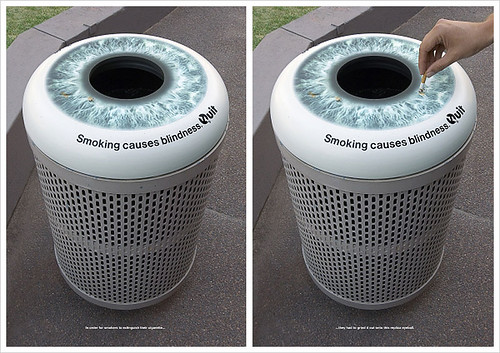You Can Quit Smoking With These Highly Effective Tips
You will not be able to stop smoking if you are not motivated. You will experience many benefits from giving up this habit. Choosing a couple of these benefits as motivating factors should be enough to keep you going when things get tough. For example, kicking the habit will save money, preserve your appearance and work toward a long and healthy life with your family. The suggestions below will help you to release your addiction to tobacco. When you feel the desire to smoke, try to postpone your cigarette as long as possible. Tell yourself you need to go for a walk first, or maybe that you need to drink a glass of water first. This break between the craving and its fulfillment may enable to not smoke that cigarette after all. If you still feel you need that cigarette, delaying it may mean you will be smoking at least one less on that particular day. Make your self a list of the reasons to and the reasons not to stop smoking. Your mind tends to take something more seriously when you write it down. It will help you stay motivated and focused on success, possibly making quitting a little easier. Make sure you take the process one day at the time. Quitting smoking is a long process. Don't worry about tomorrow, next month or even next year. Simply worry about today and take it day by day, trying to eliminate your smoking habits in the present, as this in turn, will change the future. If you are sincere in your effort to quit, find a support group and stick with them. There is great benefit in networking with people who understand the physical and emotional challenges you are facing. These types of people can be a great backbone that can help you quit, and get through this. You can find groups for support at local churches, recreational centers or community colleges. Smoking is a step-by-step process that should be done day by day. Don't think about quitting forever; instead focus on today. You'll feel like you've achieved more by celebrating every single day you don't smoke. Remember, you can set yourself long term goals as your commitment to quitting gains ground. Tell your family and friends, if you plan on quitting smoking. Entrusting familiar people with this information can let them motivate you, along with helping you beat temptations. It will give you the ability to ask for help when you need it and aid others in understanding your situation. Get into a fitness routine by joining a gym and occupy your smoking time with beneficial exercise. Exercise is also a very effective stress reliever. Do not let your lack of exercise impede you. Start small and move forward from there. Speak to a physician before you start any kind of exercise regimen. You should worry about going through one day after another. Take one day at a time when quitting smoking. Sometimes having a shorter timeline makes things easier on you mentally and physically. Remember, you can set yourself long term goals as your commitment to quitting gains ground. When the temptation to smoke overwhelms you, using stalling tactics to make yourself wait. By telling yourself that you'll see how you feel in 10 minutes, and then distracting your mind and body during that time, you will normally find that 10 minutes later, the craving will have passed. If the craving is still there, repeat the process as often as you need to. If you're having trouble quitting smoking on your own, talk to your doctor. These days there are many medications that can help to ease your efforts to stop smoking. Your doctor probably can also offer information about hot-lines, support groups and other resources that will increase the likelihood that you will be able to quit. Reduce the number of cigarettes you smoke a little each day. That way, you can get off to a good start in your efforts to quit smoking. You should wait at least an hour before you have your first smoke of the day. If it is difficult to reduce the number of times you smoke per day, so try cutting back on the amount of cigarette you smoke per time. Try smoking only half a cigarette instead of a full cigarette. If you want to stay away from any weight gain that you will have that is involved with quitting smoking, try eating fruits and vegetables. This will help curb any weight gain that you might experience. Your body will likely crave food as you stop smoking, so allow yourself to snack using healthy treats to keep your mind and body in top shape. Set up a reward scheme for yourself in advance, and each time you hit a goal, treat yourself. Develop a list of different types of rewards depending on the milestone that you hit for extra motivation. Make sure that you put your reward list in a spot where you can see it daily. It might provide inspiration and motivation during difficult times.
You will not be able to stop smoking if you are not motivated. You will experience many benefits from giving up this habit. Choosing a couple of these benefits as motivating factors should be enough to keep you going when things get tough. For example, kicking the habit will save money, preserve your appearance and work toward a long and healthy life with your family. The suggestions below will help you to release your addiction to tobacco. When you feel the desire to smoke, try to postpone your cigarette as long as possible. Tell yourself you need to go for a walk first, or maybe that you need to drink a glass of water first. This break between the craving and its fulfillment may enable to not smoke that cigarette after all. If you still feel you need that cigarette, delaying it may mean you will be smoking at least one less on that particular day. Make your self a list of the reasons to and the reasons not to stop smoking. Your mind tends to take something more seriously when you write it down. It will help you stay motivated and focused on success, possibly making quitting a little easier. Make sure you take the process one day at the time. Quitting smoking is a long process. Don't worry about tomorrow, next month or even next year. Simply worry about today and take it day by day, trying to eliminate your smoking habits in the present, as this in turn, will change the future. If you are sincere in your effort to quit, find a support group and stick with them. There is great benefit in networking with people who understand the physical and emotional challenges you are facing. These types of people can be a great backbone that can help you quit, and get through this. You can find groups for support at local churches, recreational centers or community colleges. Smoking is a step-by-step process that should be done day by day. Don't think about quitting forever; instead focus on today. You'll feel like you've achieved more by celebrating every single day you don't smoke. Remember, you can set yourself long term goals as your commitment to quitting gains ground. Tell your family and friends, if you plan on quitting smoking. Entrusting familiar people with this information can let them motivate you, along with helping you beat temptations. It will give you the ability to ask for help when you need it and aid others in understanding your situation. Get into a fitness routine by joining a gym and occupy your smoking time with beneficial exercise. Exercise is also a very effective stress reliever. Do not let your lack of exercise impede you. Start small and move forward from there. Speak to a physician before you start any kind of exercise regimen. You should worry about going through one day after another. Take one day at a time when quitting smoking. Sometimes having a shorter timeline makes things easier on you mentally and physically. Remember, you can set yourself long term goals as your commitment to quitting gains ground. When the temptation to smoke overwhelms you, using stalling tactics to make yourself wait. By telling yourself that you'll see how you feel in 10 minutes, and then distracting your mind and body during that time, you will normally find that 10 minutes later, the craving will have passed. If the craving is still there, repeat the process as often as you need to. If you're having trouble quitting smoking on your own, talk to your doctor. These days there are many medications that can help to ease your efforts to stop smoking. Your doctor probably can also offer information about hot-lines, support groups and other resources that will increase the likelihood that you will be able to quit. Reduce the number of cigarettes you smoke a little each day. That way, you can get off to a good start in your efforts to quit smoking. You should wait at least an hour before you have your first smoke of the day. If it is difficult to reduce the number of times you smoke per day, so try cutting back on the amount of cigarette you smoke per time. Try smoking only half a cigarette instead of a full cigarette. If you want to stay away from any weight gain that you will have that is involved with quitting smoking, try eating fruits and vegetables. This will help curb any weight gain that you might experience. Your body will likely crave food as you stop smoking, so allow yourself to snack using healthy treats to keep your mind and body in top shape. Set up a reward scheme for yourself in advance, and each time you hit a goal, treat yourself. Develop a list of different types of rewards depending on the milestone that you hit for extra motivation. Make sure that you put your reward list in a spot where you can see it daily. It might provide inspiration and motivation during difficult times.












